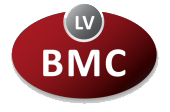![]()
Project title: Glioma invasion assays as a predictive tool for personalized glioma medicine” (Glioma-PerMed)
Funding Prevention in Personalised Medicine ERA PerMed
Project No.: ES RTD/2023/20
Period: 1st of Augusts 2023 – 31th July 2026
Project costs: 300 000,00 EUR
Principal Investigator BMC: Dr. biol. Vita Rovīte
Cooperation partners:
Coordinator – University of Dusseldorf, Germany
Norwegian University of Science and Technology (NTNU)
Technion – Israel Institute of Technology
University Hospital Düsseldorf, Heinrich-Heine-University
Project summary:
Glioblastoma multiforme (GBM) is the most frequent malignant brain tumor. GBM possesses glioma stem cells (GSCs) that aggressively infiltrate the brain. GBM patients’ median survival is <24 months, and there is no cure. There are also significant bottlenecks that currently limit GBM therapeutics:
- GBMs are highly heterogeneous and unique for each patient, preventing “one therapy for all.”
- GSCs are highly diffusive from the tumour and invade the brain rapidly and unpredictably.
In “Glioma-PerMed”, we will establish rapid and efficient glioma invasion assays and machine learning algorithms to predict the GSCs invasion and achieve personalized diagnostics, drug discovery, and patient follow-up.
To this end, it is necessary to develop suitable models that recapitulate the complex human brain environment and translate into clinical application. 3D brain organoids, powerful in vitro systems of human brain tissues and emerging as a 3D substrate to model glioma, will be a centerpiece of this project. Building on our established patient-derived GSCs invasion assay in human brain organoids, we propose a highly interdisciplinary and translational research project, “Glioma-PerMed”, to develop personalized glioma invasion assays in human brain organoids and zebrafish. We will quantitatively determine the GSCs invasion behaviors and correlate to their genomic and transcriptomic landscape with unbiased machine learning algorithms to stratify patients. Our “personalized glioma invasion” platform will also offer to screen FDA-approved drug libraries and identify molecules that can readily and quickly be transferred to GBM patients in the clinics.
By inventing a strategy that can rapidly recapitulate the invasion behaviour of GSCs in individual patients, we will stratify GBM patient groups and identify patient-specific therapeutic molecules that can perturb GSCs invasions in clinical settings. Ultimately, our work will be the first step towards personalized GBM medicine.
Information published 01.08.2023.

